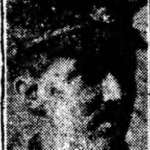HENRY WOGDEN 12/112 was born Newington, Hull April 1879. Son of Henry and Jane Wogden (1837-1923), of 11, Isabella Terrace, Lorne Street, Hull (1911 Census); 18, Rodney Street, Hull (Army records address) and 8, Alexandra Crescent, Alexandra Road, Hull (War Pension address). His father had been a Juvenile criminal, sentenced to 3 months aged 15, for cattle stealing. Henry himself had been on trial aged 8, but was acquitted on 23 Jun 1887. He had one half brother, John Oldbridge, and four half sisters, all elder than him.
He married, Alice Agnes Wharf (1885-1968), at St. Augustine’s in Hull on 4th December 1904. The couple lived at 3, Park Terrace, Seaton Street, Hull (1911 Census) and 8, Alexandra Avenue, Alexandra Road, Hull (War Pension address). They had two children James and Harriet.
An Engine Cleaner by trade, described as 5 foot, 6 inches tall, 126 lbs weight, 35-37 inch chest, good physical condition, grey eyes, dark brown hair, Church of England religion, a Tattoo of Alice” on his arm.
He enlisted at Hull City Hall, on 14th September 1914, joining the 12th Battalion, East Yorkshire Regiment, (3rd Hull Pals). He trained at Dalton Holme, Ripon and Salisbury Army camps. Henry served in Egypt from December 1915 and France, from March 1916. He was killed at Serre, on the Somme, on 13th November 1916. His body never recovered and he is commemorated on the Thiepval Memorial; he was 37 years old and had served in the army, for two years and 61 days. His name is recorded on the WW1 Memorial, at St Johns church, Newland, Hull.
Private Pearson was a runner that day:
“I was given a message to take back to HQ in the reserve line and my journey took me along a long communication trench….which before the morning attack was six foot deep, well sandbagged and strengthened- it had to be because Jerry took a particular dislike to it from its first appearance and shelled it regularly- its walls were now flattened and the trench was now lined with corpes, one on top of another, dead and wounded, some just naked bodies stripped bare by the terrible concussion of the German shells……as I stood there transfixed, enemy machine gunners spotted me and so fierce was their fire that I had to drop down among those bodies and continue my journey on my stomach.”
